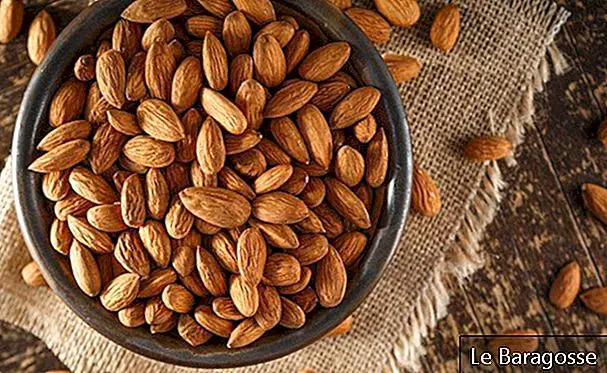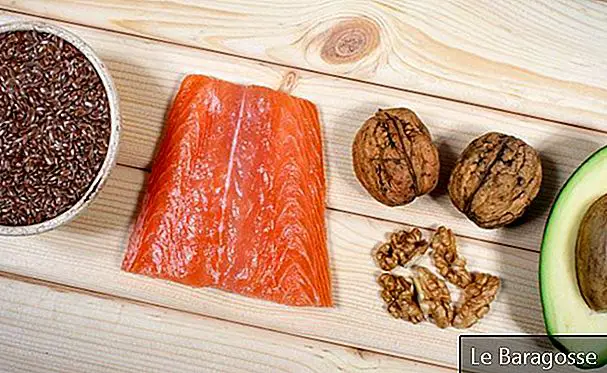
Do you often forget where you left the house key? Have you ever been to the supermarket and returned without bringing something important? Did you totally forget about the doctor appointment you had scheduled last week ?!
Calm down, you're not the only one! Not many people comment that if they do not write in the agenda, they forget their appointments and all they had to do!
Although memory problems are commonly associated with increasing age, it is not difficult to find young people complaining of "poor memory" today.
The daily rush, sleepless nights, stress, depression, use of certain medications, excessive alcohol consumption and nutritional deficiencies are some of the factors that can affect memory, regardless of the age of the person.
Not to mention diseases (such as dementia, Alzheimer's disease, etc.), which often cause memory problems along with other symptoms. In such cases, of course, it is necessary to consult a specialist for proper diagnosis and complete treatment.
Read also: See 10 powerful teas that help you lose weight and rejuvenate
But dealing with the? General memory problems? It can often be easier than you think! Check out below foods, tips and home recipes that can help improve your memory:
1. Eat almonds

Nutritionists Mariéllen Emidio Figueroa and Michelle Mileto Troitinho of Kurotel? Lawn Longevity Medical Center and Spa explain that almonds help improve memory by the same mechanism that helps prevent cardiovascular disease: they provide antioxidant compounds and vitamin E.
"Studies indicate that eating a portion of almonds daily as part of a healthy lifestyle can lower" bad "cholesterol levels. (or LDL) and help reduce the risk of heart disease. Many of the cardiovascular risk factors have been shown to be risk factors for dementia, including Alzheimer's disease. Protecting blood vessels by following a heart-healthy diet also has the effect of protecting the mind?
2. Use coconut oil

Coconut oil is already well known for the numerous health benefits it offers. Priscila Ribeiro Amadio, nutritionist at Chiquetá Clinic, comments that a study published in the journal Neurobiology of Aging2004 showed that consumption of medium chain triglycerides (the main fat found in this oil) resulted in rapid improvement in cognitive function in elderly patients with memory loss. .
Nutritionists Mariéllen and Michelle point out that coconut oil has shown improvement in the cognitive process of people with Alzheimer's (a disease that causes cognitive decline and memory loss), because its metabolism can generate ketone bodies? important alternative energy source for the proper functioning of the brain. "It also has antioxidant activity and helps in reducing risk factors for this disease (such as high cholesterol, high blood pressure and hyperglycemia)," they explain.
Read also: Learn about incredible benefits of Ginkgo Biloba and how to use it.
3. Bet on foods that contain omega-3s.

Nutritionists explain that omega-3 fatty acid is a type of polyunsaturated fat present in deep and cold-water fish such as salmon, sardines, anchovy, mackerel and herring. This fat is also found in plant sources such as flaxseed, primrose and chia. Among its benefits, what stands out is improved cognition, protecting neurons from degeneration. It also potentiates the effect of B-complex vitamins on phosphatidylcholine formation, improving cell membrane plasticity. Does it help by reducing inflammatory markers in the hippocampus, along with the B-complex vitamins (folic acid, vitamin B6 and vitamin B12) that prevent the increase of homocysteine in the blood ?.
Several studies show that high levels of homocysteine (inflammatory marker for cardiovascular disease) are associated with cognitive impairment. It also helps prevent Alzheimer's as it reduces risk factors for Alzheimer's such as triglycerides and inflammation?
4. Bet on Rosemary

Mariéllen comments that, according to researchers at the University of Northumbria, rosemary essential oil may help in future memory. Some rosemary oil compounds, the main one being 1.8-cineol, are responsible for increasing the production of the neurotransmitter acetylcholine in the brain.According to this study, with the inhalation of small chemical compounds found in rosemary essential oil, they can pass into the bloodstream and then be transported to the brain, promoting increased understanding of memory and brain function, he says.
Priscila points out that, as the studies indicate, inhalation is the best way to enjoy the benefits of rosemary with regard to memory performance.
The simplest way to do this is to breathe in the aroma of rosemary oil or add a few drops to a diffuser and place it in your room, for example.
Read also: Learn 8 Natural Remedies to Relieve the Effects of Menopause
5. Eat Cinnamon

Among the many health benefits it offers, cinnamon also seems to improve learning ability. In a rat study, they were given oral feed of ground cinnamon, which their bodies metabolized to sodium benzoate, a chemical used as a brain damage drug treatment. When sodium benzoate entered the brain of rats, it increased CREB, decreased GABRA5, and stimulated the plasticity (ability to alter) of hippocampal neurons. These changes, in turn, led to improved memory and learning among mice ?, explains Michelle.
Priscila points out that cinnamon boosts brain activity, acting as a? Good tonic? cerebral.
And it is not difficult to consume cinnamon daily: it can be peppered with fruits, mixed with drinks and various preparations. Here's the tip!
6. Use Tualang Honey

This honey found in Malaysia has attracted a lot of attention because of its beneficial effects on learning and memory, as Mariéllen points out. Studies show that it improves memory morphology as it reduces oxidative stress in the brain. Cognitive impairment can be prevented or significantly delayed by increased intake of antioxidants such as vitamins C and E, and? -Carotene. And does this kind of honey contain good amounts of antioxidants like flavonoids (catechin, kaempferol, naringenin, luteolin and apigenin) and phenolic acids and gallic acids? Thus revealing its neuroprotective effect on oxidative stress, improving cognitive ability ?, says.
7. Bet on Ginseng

Michelle explains that Ginseng has antioxidant activity with protective action of cells at the level of the Central Nervous System. "But other specific actions on these cells are demonstrated, the effects of which include increasing the survival time of neuronal cells and recovering from various damage, preventing apoptosis (cell death) and extending the neuronal network," he says.
Read also: 10 Natural Soothing that Help Treat Anxiety, Insomnia, and Even Depression
Priscila points out that by reducing the effects of stress (one of the biggest causes of memory impairment in young people), Ginseng helps improve memory and is widely used in the treatment of fatigue and for concentration.
8. Consume Ginkgo Biloba

Mariéllen comments that Ginkgo Biloba helps improve memory by protecting the brain from oxidative damage by blocking apoptosis (cell death) mechanisms in its early stages. The use of 180 mg / day for 6 weeks in 48 adults over 55 years was associated with objective improvement in cognitive processing speed and a subjective impression of improved overall memory skills (Mix and Crews, 2000). ?, he says.
As the nutritionist explains, Ginkgo Biloba influences the brain in several ways:
- Stimulates blood vessel dilation;
- Lowers blood cholesterol levels
- Improves glucose absorption;
- Assists in the proper functioning of brain neurotransmitter systems.
Priscila points out that despite the many advantages of Ginkgo Bilona over memory improvement, it should not be consumed without prescription as it may interfere with other medications.
9. Use spices and herbs such as turmeric, pepper and basil.

Michelle explains that turmeric (turmeric) has an antioxidant compound called curcumin, which has anti-inflammatory action. Recent studies have linked daily consumption of curcumin with the ability to prevent neuron death in neurodegenerative diseases and to reduce cognitive decline (dementia) with aging. One of the possible mechanisms for this to happen is that curcumin would be responsible for the activation of enzymes involved in the regulation of plasticity and repair of neurons ?, he says.
Basil, as nutritionist Michelle points out, is rich in phenolic compounds such as lutein, cryptoxanthin and xanthins, and contains vitamins A, C and K, and minerals zinc and magnesium. "The antioxidant compounds in basil help with brain circulation, reducing brain damage and the risk of neurodegenerative disease," he says.
Michelle also points out that a study conducted at the University of São Paulo (USP) analyzed the antioxidant properties present in black pepper and pink pepper. "It has been found that the activity of pepper antioxidants inhibited the action of the enzyme acetylcholinesterase (enzyme that degrades acetylcholine, a neurotransmitter involved in memory and learning retention)," he explains.
10. Season with olive oil

Mariéllen advises consuming cold-pressed extra virgin olive oil (remembering that it is a source of omega-3): the amount of one tablespoon a day on salad or ready-to-eat foods is sufficient to provide benefits.
11. Bet on the dark chocolate

Michelle advises eating 10g of dark chocolate daily (over 70%), which increases cognitive performance (memory and concentration) due to the high content of antioxidants such as resveratrol.
12. Eat oil seeds and / or seeds daily

Michelle also advises to include a portion of the group of oil seeds (Brazil nuts, walnuts, almonds, hazelnuts, pistachios) and / or seeds (sunflower, flaxseed, sesame) daily in the diet: or grate over salads or dishes.
"These are seeds rich in vitamin E and selenium, nutrients that increase the protection of neurons against the effect of free radicals," explains the nutritionist.
13. Exercise

Priscila points out that exercise increases brain oxygenation, as well as helping to prevent and even treat memory-impairing illnesses (such as high blood pressure, diabetes, and cholesterol changes).
Mariéllen points out that epidemiological data confirm that moderately active people are less likely to be affected by mental disorders because they have faster cognitive processing than sedentary ones.
The dietitian also adds that, according to studies, walking three times a week, along with stretching and flexibility exercises, improves attention, memory, agility and mood.
14. Consume? Colorful foods?

Michelle points out that it is important to eat red, purple or bluish foods (blackberries, grapes, plums, blueberries, red onions, eggplants, beets, acai) and dark green and yellow / orange foods (broccoli, arugula). , watercress, green cabbage, pumpkin, papaya, carrot, orange etc.). It can be in the form of freshly made juices, creams, in salads or as a side dish. Preferably raw or steamed, "he explains.
15. Have Green or White Tea

Mariéllen recommends drinking green tea or white tea daily: two to three cups a day, away from main meals (lunch / dinner) and away from bedtime.
16. Follow a balanced diet

Not everyone realizes this, but healthy eating is closely linked to the proper functioning of the brain and hence memory.
Michelle explains that deficiency of nutrients essential for neuron formation, maintaining proper brain function and protecting the body against free radical action can increase the risk of developing neurodegenerative diseases. These nutrients are:
- Vitamin E
- Polyunsaturated fat
- Omega-3 (all found in extra virgin olive oil, flaxseed, chia and fish)
- B vitamins (beans, brown rice, oats, seeds, nuts, egg yolk, dark green leaves)
- Phytoestrogens (soy and derivatives)
- Calcium and magnesium (collard greens, broccoli, beans, chickpeas, yogurt, lean cheese, sesame, sardines, almonds)
- Hill (egg yolk)
- Cocoa (dark chocolate; to improve cognition)
Thus, a balanced diet provides the body with all the nutrients it needs to function well, and is ideal for avoiding memory problems, among others.
17. Make sure your health is in order?

It is essential to be up to date with medical appointments and exams ordered in order to stay healthy overall.
Mariéllen explains, for example, that estrogen (female hormone) acts significantly on women's cognition and mental health. • Sudden falls or fluctuations and long periods of low levels of this hormone are related to memory and cognition problems. Already the hormone in adequate levels reduces inflammation improving synapse (communication between neurons) ?, says.
18. Have Healthy Habits

In addition to performing physical exercise and eating healthy, having moments of relaxation and restful sleep is essential for improving memory.
It is also important to create memory storage strategies, such as: getting into the habit of reading, doing crossword puzzles and practicing meditation.Avoiding medications without medical recommendation, in addition to alcohol often and not smoking are also factors that help preserve memory ?, says Michelle.
Now you know that with simple changes in habits and a balanced diet you can greatly improve your memory and take better care of your overall health! How about starting today ?!
Exercise Your Brain To Prevent Memory Loss-Mayo Clinic (April 2024)
- Prevention and Treatment
- 1,230
















